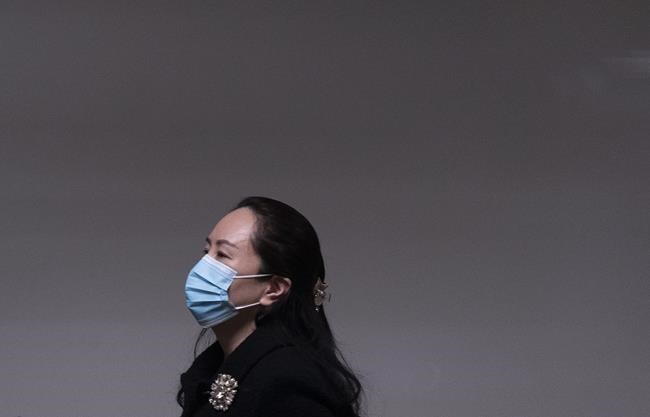VANCOUVER — The border officer who led Huawei executive Meng Wanzhou's immigration exam before her arrest at Vancouver's airport says he doesn't believe RCMP asked him to collect the passcodes to her phones.
Sowmith Katragadda told an evidence-gathering hearing in Meng's B.C. Supreme Court extradition case this week he couldn't recall where the idea came from.
He said Friday that he was in his superintendents' office, where some RCMP officers were waiting to arrest Meng, when he asked his colleague by radio to collect the passcodes from Meng.
"It was in fact the RCMP in the superintendents' office who asked you to get the passcodes, isn't it?" Meng's lawyer Mona Duckett asked Katragadda during cross-examination.
"I do not believe so," Katragadda said.
Meng's lawyers are collecting information they hope will bolster their allegation that Canadian officials improperly gathered evidence during her arrest in 2018 at the request of American officials under the guise of a routine immigration exam.
Meng is wanted in the United States on fraud charges based on allegations related to U.S. sanctions against Iran that both she and Huawei deny.
The court has heard that Meng's passcodes were collected as part of the border exam process and passed to RCMP along with her electronic devices by mistake.
Katragadda has testified that he wanted to adjourn the exam as quickly as possible but was told to wait while his superior consulted the Canada Border Services Agency's national security unit.
He was aware of the seriousness of the case and didn't want to delay the RCMP's arrest of Meng unnecessarily, he told the court.
He asked Meng questions provided by the security unit and when he learned the unit had no further guidance, he adjourned the exam, expecting it to resume if Meng ultimately was not extradited, he told the court.
Katragadda said he filled out an immigration warrant that would compel Meng's return to the CBSA to complete the exam at a later date.
Duckett challenged Katragadda's authority to issue Meng a warrant, noting the legal wording under the Immigration and Refugee Protection Act declares "reasonable grounds to believe" a person is inadmissible as a threshold.
Although Katragadda said he had developed some suspicion that Meng might be inadmissible to Canada because of possible criminality and national security concerns, he acknowledged that he had not developed "reasonable grounds to believe" so.
Katragadda has also testified that he informed the RCMP before Meng's plane landed that if they had questions about the exam, they could make a legal request for information through Section 107 of the Customs Act.
Duckett challenged Katragadda's narrative, suggesting he only raised the issue in the superintendents' office when RCMP showed interest in the passcodes.
"I disagree if it was solely for that context," Katragadda responded.
"It was the passcodes — that's when you raised the Section 107 issue in the superintendents' office, just before the exam was adjourned," Duckett said.
"I do not recall what prompted me raising Section 107. I can't say one way or another," he said.
"Might have been the passcodes," Duckett said.
"Possible," Katragadda said.
This report by The Canadian Press was first published Nov. 20, 2020.
Amy Smart, The Canadian Press



